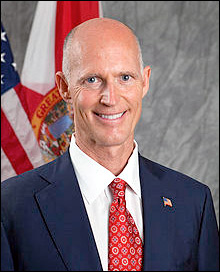
President Joe Biden / Photo by Gage Skidmore
By Jim Ellis — Thursday, Aug. 3, 2023
President
Polling: Biden at Lowest Job Approval Rating — News reports are quoting the recent CBS News poll from the YouGov international polling firm (July 26-28; 2,181 US adults; online) as giving President Joe Biden his lowest job approval rating to date. The CBS result found a whopping 60 percent saying they disapproved of the president’s performance in office.
Lately, presidential job approval polling is prevalent. Several firms, such as Morning Consult and Rasmussen Reports, track presidential job performance daily. Therefore, we frequently see a rather wide range of Biden performance ratings on a regular basis.
According to the FiveThirtyEight data organization, President Biden’s positive job approval response from July 26 through Aug. 1 ranged from 35 percent (Premise) all the way to 47 percent (Rasmussen Reports). The president’s disapproval score was recorded from a low of 51 percent (Rasmussen) to a high of 60 percent (YouGov for CBS; Premise).
Regardless of how the job approval research data may vary from day to day, it is curious to see just how these numbers compare with the historical presidential research. The Gallup data firm began presidential approval polling and has charted it ever since President Harry Truman began preparing for the 1948 national election.
According to the current Gallup data, last recorded on President Biden’s 918th day in office, 40 percent of the sampling universe graded him with a positive job approval score (Gallup only records the positive approval response on their historical chart).
Reviewing the 14 presidents from Truman through Biden, inclusive, we look at where certain other presidents stood at around this same time in their own administrations. Interestingly, three other presidents were within the same approval rating realm as Biden at this same approximate point in their presidencies. The three are: Donald Trump (42 percent at the 922nd day of his presidency); Barack Obama (42 percent; 929); and Ronald Reagan (44 percent; 923).
As you can see just from this group, presidential approval 18 or so months before the general election is not an absolute predictor as to whether the subject wins or loses the succeeding national election. Just from the above sample of three, we see one who lost (Trump) and two who won (Obama, Reagan). President Reagan, in fact, had the highest growth rate from his standing 923 days into his term to his final vote percentage of all 14 charted presidents (44 percent approval; 58.8 percent vote percentage in the 1984 election; a comparative gain of 14.8 percentage points).
This tells us that presidential job performance between the commensurate benchmark point in time and the election, and running a sound campaign, are far more important factors in determining presidential re-election outcome than job approval at this point in the term.
Interestingly, the three presidents with the highest approval rating at the commensurate benchmark who ran for re-election: George H.W. Bush (72 percent approval; 905th day in office); Dwight Eisenhower (72 percent; 910); and George W. Bush (62 percent approval; 900) were also the three who lost the most percentage points from their approval ratings in comparison to their ending vote percentage.
In fact, as we know, the leader at this commensurate point, George H.W. Bush with a 72 percent positive job approval, would go on to lose re-election with a finishing popular vote percentage 34.5 points lower than his approval score 18 months before the 1992 national vote. Both presidents Eisenhower and George W. Bush followed the same pattern, but not as dramatically. Eisenhower dropped 14.6 percent from his approval rating to final vote percentage, and Bush, 11.3 percent.
Overall, of the 14 presidents with recorded job approval scores throughout their tenure in office, seven won the succeeding election and four lost. Two — presidents John F. Kennedy and Lyndon Johnson — did not seek another term. Obviously, Kennedy had been assassinated, while Johnson declined to run.
Of the seven who won the succeeding election, four had positive job approval ratings approximately 18 months before the vote (Truman, Eisenhower, Richard Nixon, and George W. Bush), while three did not (Reagan, Bill Clinton, and Obama).
From the group of four presidents who lost the succeeding election, two had positive ratings approximately 900 days into their terms (George H.W. Bush and Gerald Ford), and two were in upside-down territory (Jimmy Carter and Trump).
Though President Biden has low approval ratings at this juncture, it is by no means certain that he will fail to win re-election in 2024. History tells us that any result can still happen.




 By Jim Ellis
By Jim Ellis